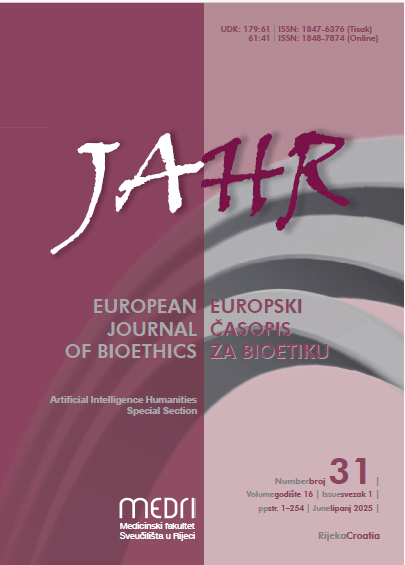Metodoontološko viđenje pojma mentalnog zdravlja kod Marxa,Freuda i frankfurtovaca
Keywords:
Metodoontologija, mentalno zdravlje, Karl Marks, Sigmund Frojd, Frankfurtovci, Erih From, Herbert MarkuzeAbstract
https://doi.org/10.21860/j.16.1.4
Autor u ovom istraživanju želi iz vlastita metodoontološkog viđenja razmotriti u današnje doba sve češće korišten pojam mentalnog zdravlja. To se nastoji ostvariti prateći tragove Ericha Fromma u okvirima VII. poglavlja knjige „S onu stranu okova iluzije” (1962), koje upravo nosi naziv „Pojam mentalnog zdravlja”. Ovdje on govori samo o Marxu, koji smatra zdravim čovjekom onoga tko je produktivan i tko se iskreno zanima za svijet, dok bi za Freuda „samo primitivan čovjek mogao biti nazvan zdravim”. Osim svih važnih Marxovih i Freudovih radova, kao i ovoga Frommovog djela, posebna će se pažnja posvetiti i drugim njegovim djelima, poput „Zdravog društva” (1955) i godinu dana kasnijeg „Umeća ljubavi” (1956), ali svakako i rada Herberta Marcusea, posebno u djelu koje je objavljeno u godini (1955) kada i Frommovo „Zdravo društvo” – „Eros i civilizacija”.
Downloads
Published
Issue
Section
License
Authors who publish with this journal agree to the following terms:
- Authors retain copyright and grant the journal right of first publication with the work simultaneously licensed under a Creative Commons Attribution License that allows others to share the work with an acknowledgement of the work's authorship and initial publication in this journal.
- Authors are able to enter into separate, additional contractual arrangements for the non-exclusive distribution of the journal's published version of the work (e.g., post it to an institutional repository or publish it in a book), with an acknowledgement of its initial publication in this journal.
- Authors are permitted and encouraged to post their work online (e.g., in institutional repositories or on their website) prior to and during the submission process, as it can lead to productive exchanges, as well as earlier and greater citation of published work (See The Effect of Open Access).



